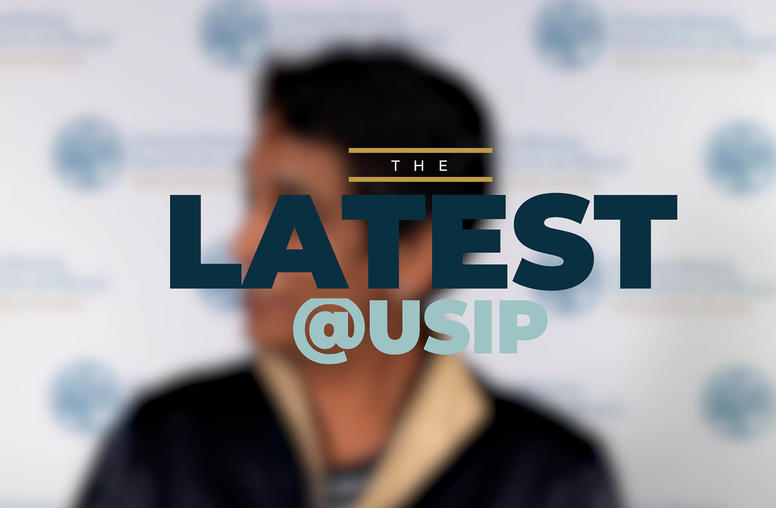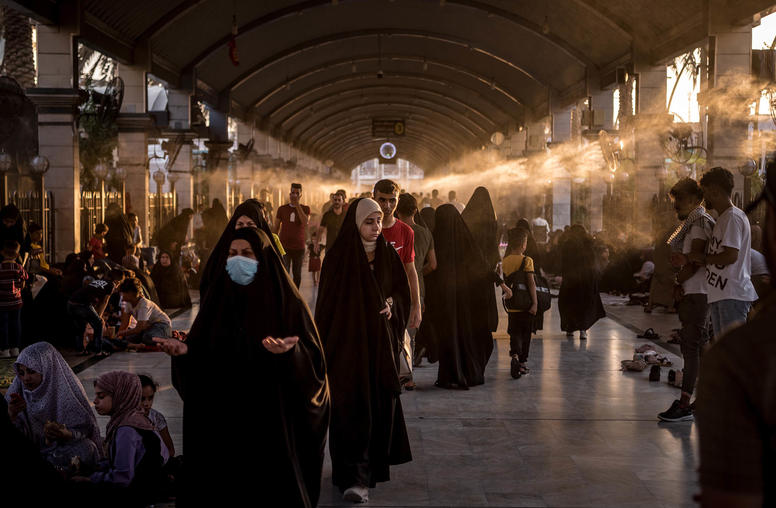International aid prioritizes the pandemic over peace. But at what cost?
Donors should reframe their approach to COVID-19 and peacebuilding in the Middle East and North Africa, focusing on local priorities.
Editor’s Note: This article was cross posted in collaboration with the Overseas Development Institute.
With the novel coronavirus emerging in late 2019, the attention of Western governments and international NGOs was dominated by the COVID pandemic in 2020, upending everything from domestic policies to international assistance priorities. The Devex funding database reveals more than $20.5 trillion has been committed to the global COVID-19 response from January to November 2020, with around $186 million for the Middle East and North Africa (MENA) region. Does this prioritization of COVID align with challenges facing the people of the region? Conversations with local peacebuilders expose that although the COVID cases might increase in 2021, pressing socioeconomic needs continue to trump concerns about the pandemic.

Research from ODI-MED, the Overseas Development Institute’s initiative conducting ongoing research on peace and sustainability in the Mediterranean region, lays out the resounding message that COVID-19 aid has eclipsed more pressing priorities. A recent webinar series hosted by ODI and the U.S. Institute of Peace (USIP) on COVID-19 and local peacebuilding in Yemen, Syria, Iraq, Libya, Egypt, and Tunisia highlighted that this shift in aid will have possible adverse short- and long-term implications.
Overall, our panelists expressed that COVID-19 is a Western priority, not a Middle Eastern one. What remains true for local peacebuilders is that aspirations for peace remain inextricably intertwined with social and economic justice.
Yet the international response has been characterized by limited interaction with local actors, resulting in a poor understanding of the local political economy and actual domestic priorities. With increased local frustration toward “blind” engagement in the region, a bold reimagining of peacebuilding in the MENA region is in order.
Local Peacebuilding Prevails Despite the Pandemic
Against all odds, the pandemic has not stopped local actors in the MENA region from carrying out peacebuilding efforts, with impressive results. Examples from the USIP’s work include inspiring agreements in southern Libya, southern Tunisia and in Tal Afar, one of the most complex areas in Iraq.
The most pressing issues in conflict-affected areas remain security, access to food, socioeconomic disparity, protracted violence, and the protection of human rights, as was explicitly mentioned by local peacebuilders throughout the joint ODI-USIP webinar series.
The top 10 percent of the MENA population controls 76 percent of all income in the region. The wealth of MENA billionaires increased by $9.8 billion between March‐August 2020—equal to 200 percent of total International Monetary Fund financing to MENA countries during the same period.
The MENA region comprises 5 percent of the world population but hosts 37 percent of the global caseload of uprooted persons (refugees, migrants, or internally displaced persons).
With these contextual factors in mind, it is therefore understandable that people in the MENA region care less about COVID-19 than their own immediate and pre-existing economic needs.
COVID: Another Blemish on the Region’s Governance Record
Despite the fact COVID-19 may not be a priority issue for many in the region, it is further exacerbating fragility and undermining ailing state legitimacy in most MENA countries.
The poor and clumsy response of state institutions to COVID-19 has created serious trust and perception issues at the community level. Lack of preparedness, uncoordinated action, poor leveraging of resources (including from the corporate sector), and a misdirected focus on issues like travel or banning events have all contributed to this shared feeling. The response has also failed to address structural sources of instability through actions like stimulus packages or social safety nets, which may have proved more effective.
In our webinar series, Dr. Noor Qais, a public policy lecturer at Al Nahrain University in Iraq, highlighted the disproportionate impact of the pandemic in the region: “The consequences of COVID-19 are different and more profound in Iraq; the virus is striking developed countries hard, but conflict zones even harder. War-torn zones are doubly damaged by the pandemic where its repercussions are aggravating the effects of decades of destruction.”
Many have become increasingly skeptical over state’s ability to protect them in difficult times and have instead turned to non-state actors—including armed groups. Traditional social structures, whether tribal or religious, are also unable to fill the gap left by governments. As these state and traditional structures lose leverage in their communities, their role in leading or contributing to peacebuilding efforts is at stake.
Ceding Power to Local Peacebuilders, Tackling the Trust Deficit
The discourse on peacebuilding framed around cease-fires and peace agreements is losing its credibility with local populations. International actors must renew trust by restructuring partnerships so that local peacebuilders are not only at the table but are genuinely integrated within the various stages of the peacebuilding process.
Speakers at our webinar on COVID-19 and local peacebuilding emphatically described the disconnect between local aspirations and international engagement. Many local actors feel frustrated that the Western priority of COVID-19 was being forced upon them, resulting in donors redirecting funds away from urgent issues vital for peacebuilding.
The situation in Yemen is one example of this lopsided prioritization. “Many Yemenis can survive COVID-19, but they won’t survive hunger and war,” said Nadwa Al-Dawsari, a Yemen expert and a non-resident fellow at the Middle East Institute. A forthcoming report developed by ODI confirms the need for a more balanced approach to the war in Yemen combining humanitarian, development and peace objectives. The research also proposes that engagement be tailored to regional and local needs for recovery and reconstruction, which represent varied developmental trajectories.
As many as 45 million people in the MENA region can expect to be pushed into poverty in the next couple of years. Combined with the increased trust deficit in the state, these dual pressures will act as a detonator if they are not mitigated. Resolving ongoing violent conflicts, preventing new ones from emerging and bridging the economic and social gap requires fixing governance first.
But it is also not enough to just aim for effective and transparent governance in the region. Governments must also acquire indispensable legitimacy by reworking social contracts and demonstrating competence in reducing inequalities and social exclusion, strengthening and de-escalating social relations, as well as addressing pressing concerns that align with local peacebuilding efforts and tackle the exacerbating impact of COVID.
Ahistorical Approaches Are Missing the Point
“Deep crises have long memories,” noted writer Hisham Matar in 2016, referring to the Libyan conflict. Local peacebuilders have expressed fatigue toward international engagement that knows little of their local mediation and conflict resolution mechanisms, disregards the history of existing conflicts, or does not acknowledge the local culture and traditions of peacekeeping and peacebuilding.
Formulaic peace approaches of peace agreements, elections, stabilization and democratization are not taking root at the local level because they are culturally blind. International engagement needs to be better grounded in understanding the history of peace and conflict within the region. It also needs to be informed by an understanding of broader geopolitical dynamics and how they are localized in the Middle East.
Ahmed Abdelwahed, a member of USIP’s Regional Facilitators Forum, described how the Egyptian government’s priorities remained unchanged despite the pandemic. The Nile dam talks, for example, continue to be a priority for the Egyptian government since it has to do with the water supply of one million people and has tremendous economic, social, and security implications. Despite setbacks due to the coronavirus crisis, talks continued online thanks to political will and popular support at the national, regional, and international levels.
The Pandemic Requires a New Approach by International Actors
The repercussions of the COVID-19 pandemic have exposed the scale of social disparity in the MENA region and are causing grievances against both state and non-state structures. This requires a colossal multi-layered effort to address. But most importantly, it requires international leadership combined with local ownership.
The conversation on COVID-19 and peacebuilding in the MENA region needs to be reframed to allow for adaptive cross-sectoral engagement that balances humanitarian, developmental, peace, and protection approaches. This conversation should also lift up the remarkable local leadership in the region, strengthening it with strong international support. Local peacebuilders overwhelmingly call for a peacebuilding approach that is tied to an understanding of socioeconomic realities and priorities, security dynamics, and the politics of the conflict. Stronger linkages at the planning and programmatic levels are needed with local actors at the forefront.
International actors must think of themselves as enablers and supporters of change, not the changemakers. This supporting role must be informed by an accurate understanding of local histories and political economy at both national and subnational levels. If we have learned anything from 2020, it is that international solidarity only works if it is attuned to local needs and priorities— it is time to translate this lesson into policy.
Sherine El Taraboulsi-McCarthy is a senior research fellow at the Overseas Development Institute, where she co-leads ODI's cross-institutional initiative on the Mediterranean, ODI-MED.



